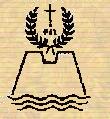|
THY SINS ARE
FORGIVEN THEE - Part I
What are sins and when are they forgiven?
The concept of sin developed from the Old
Testament, then, introduced in an improved way at the beginning of the
Gospels, was perfected by the end of Christ's sojourn here on earth.
In the Old Testament, for instance, to
commit murder, one has to actually kill someone. But in the New Testament,
call your brother, "Raca," and you are guilty of murder.
In the Old Testament, one must commit
adultery to sin; but in the New Testament, to look at another with lust
makes one guilty of adultery. A mere lustful look!
By the end of Christ's life on earth, He
had perfected the concept of sin. Sin is disobedience to Christ's commands.
And since Christ had commanded us to deny ourselves, sin is NOT denying
ourselves, or, putting it positively, doing our will.
Christ, Himself, said: "I came not to
do My will but the will of My Father in heaven." By His example, Christ
taught us not to follow our will, but the will of His Father in heaven. And
where can we find the will of the Father? In the commandments of
Christ, which are summarized in "Deny yourself, take up your cross and
follow Me."
In the garden of Eden, God expressed His
will to Adam and Eve; "Do not eat of the Tree of the Knowledge of Good
and Evil." Adam and Eve did their own will. They ate. There was nothing
wrong with the tree; this is clear even from its very name. The sin of Adam
and Eve was choosing their own will over God's will.
And so with Moses--when God commanded him
to strike the rock once that water may flow for the thirsty Israelites.
God's will was clear--strike once. But Moses struck the rock twice.
God's will was 'once'; Moses' will was 'twice'. For this, God punished him.
Obviously, Moses was doing a good work-- giving drink to the thirsty; but he
did it his own way, not God's way. How many Christians are doing good works
their own way, thus earning instead God's wrath rather than His pleasure.
And there is Peter who, out of love and
reverence, refused to have his feet washed by Christ. Christ said: Peter it
is my will that I wash your feet. Peter answered: Lord, it is my will that
You should not wash my feet. Christ retorts: Peter if you insist on your own
will, even if this is out of reverence and love, you shall have NO part of
Me. Clearly, we cannot find any defect in Peter's actions except for the
fact that he was doing his own will.
The saints had always prayed that God
remove their wills precisely because of man's tendency to choose his own
over God's will. The saints remind us that God's will for us is the best for
us. The wisest thing to do is to choose God's will.
"Thy will be done." Then we go
about doing our own will? "May it be done according to your will."
"Not My will but Thine be done." This should govern our minds and
actions.
St. Caesarius of Arles
(03-10-03)
|

